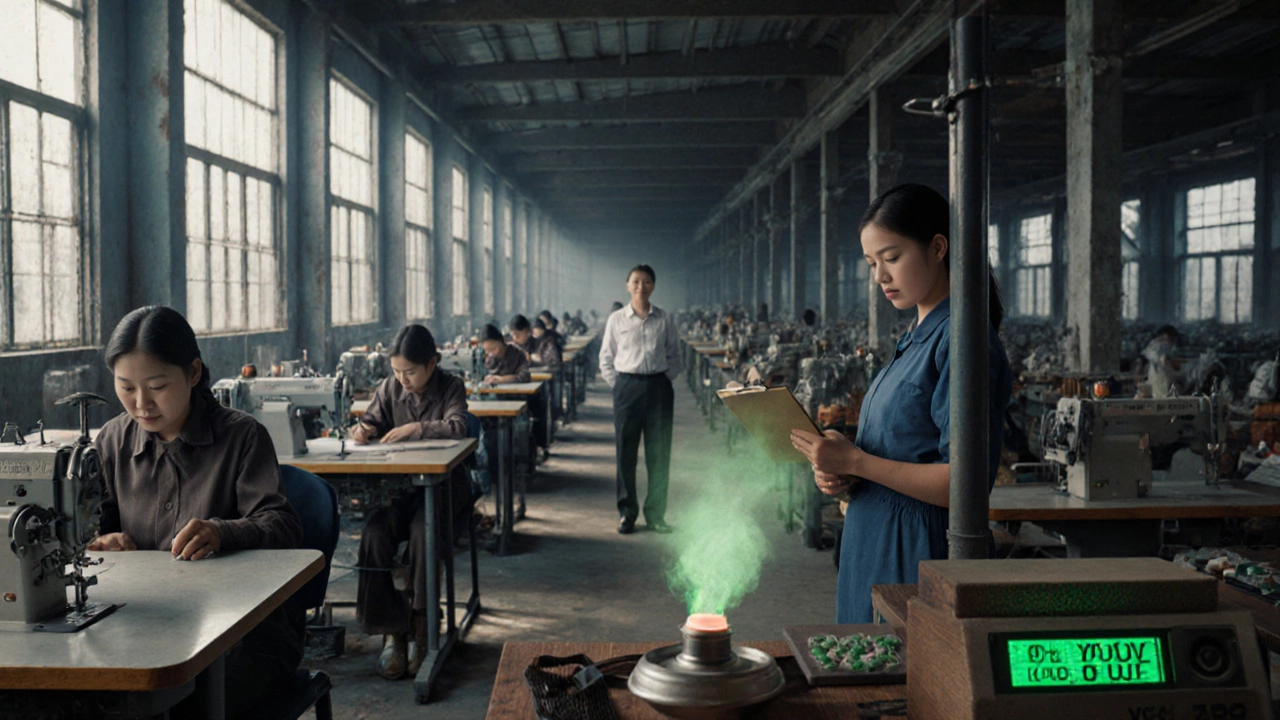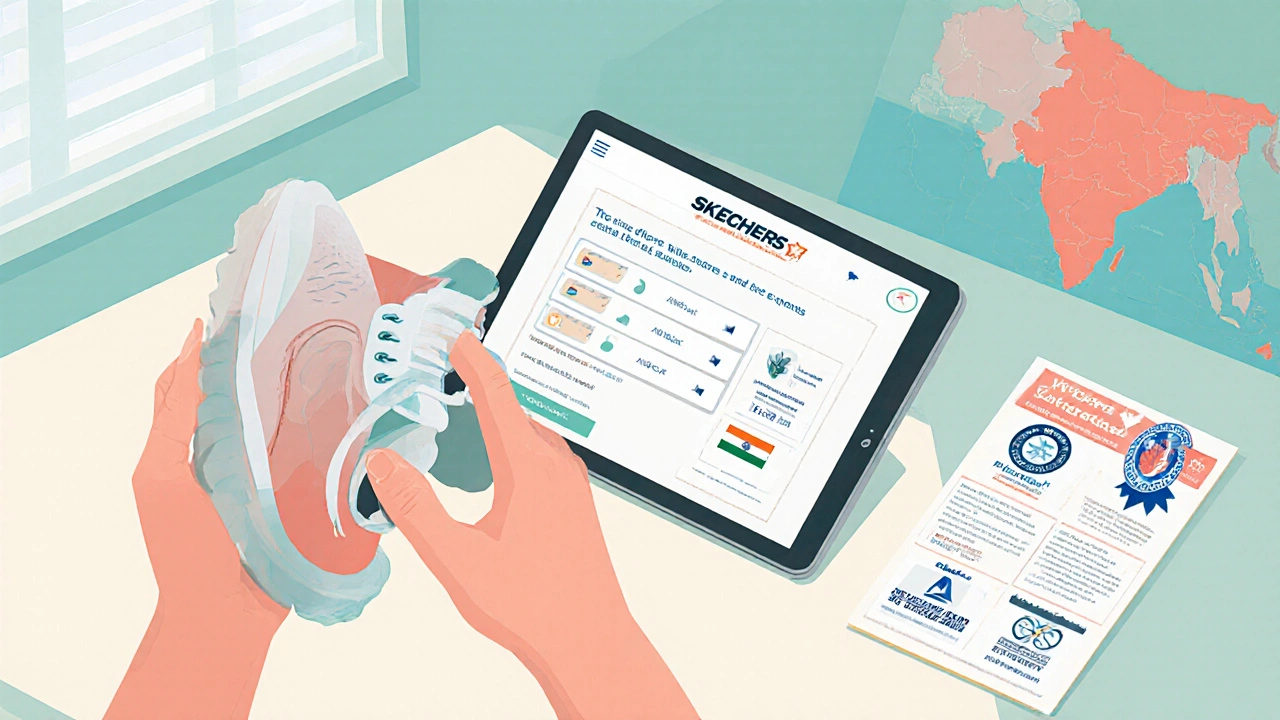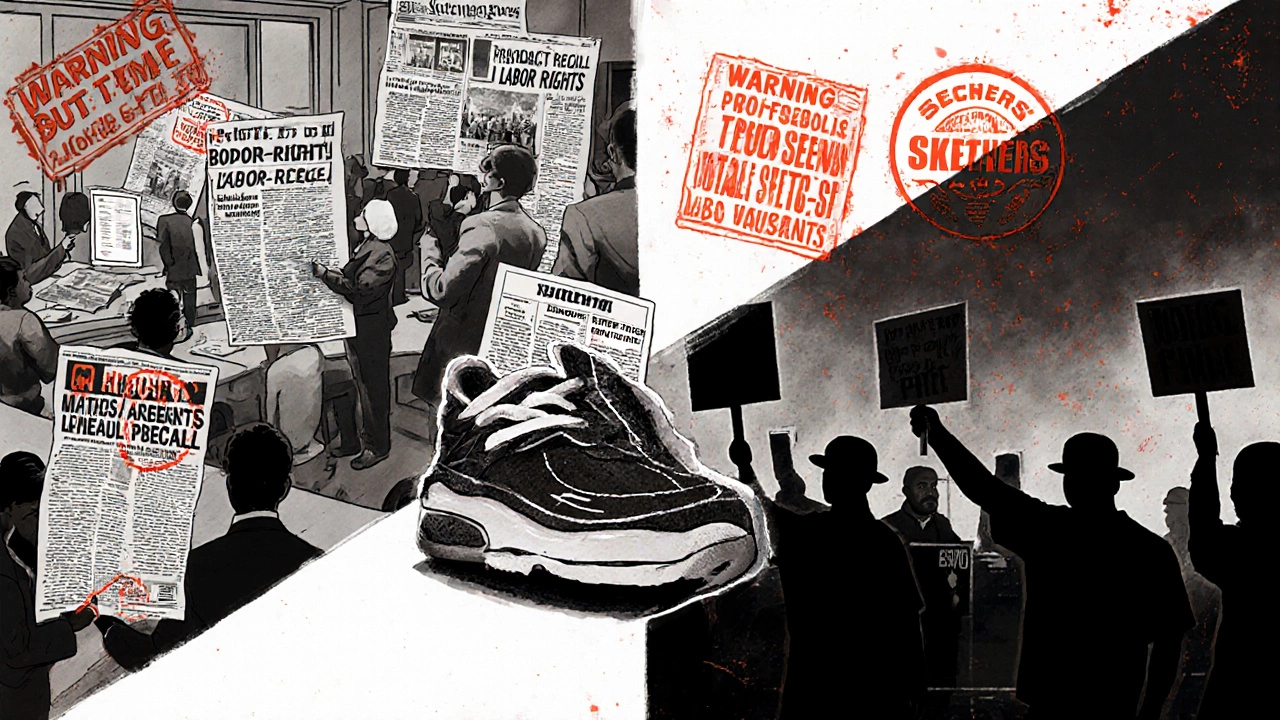Skechers Controversy Timeline Explorer
Major Skechers Controversies (2018–2025)
Click on any year to see details about that controversy:
Clean Clothes Campaign accused Skechers of using forced labor in Chinese factories.
5 million "Comfort Plus" shoes recalled due to toxic glue.
Settled over false anti-odor claims with $3.5M penalty.
Vietnam factory workers pushed for unionization rights.
Class-action suit alleges false traction claims.
Celebrity endorsement revealed as undisclosed paid content.
Select a year to learn more
Select any event from the timeline above to view detailed information about that controversy.
Consumer Action Guide
Before purchasing Skechers, consider these steps:
- Check the CPSC recall database for any model-specific recalls.
- Review Skechers' Supplier Audit Portal.
- Look for third-party certifications like Fair Labor Association or OEKO-Tex.
- Compare ethical alternatives such as Allbirds, Veja, or Native Shoes.
Key Takeaways
- Skechers has faced multiple scandals ranging from labor‑rights accusations to product‑safety recalls.
- Major legal battles include a 2022 FTC case over deceptive “anti‑odor” claims and a 2024 class‑action suit about slip‑resistant soles.
- Labor‑rights groups allege poor conditions in factories that produce Skechers shoes, especially in Southeast Asia.
- The brand’s response has shifted from denial to partial reforms, but consumer trust remains mixed.
- When deciding whether to buy, consider the specific issue that matters most to you and look for certified‑ethical lines.
Ever wondered why Skechers controversy keeps popping up in newsfeeds? The shoe giant isn’t just another fashion name-it’s a brand that’s repeatedly landed in headlines for the wrong reasons. Below we break down the main flashpoints, who’s involved, and what it means for anyone thinking about slipping on a pair.
Who is Skechers?
Skechers is a global footwear company founded in 1992 in California. It designs, manufactures, and markets casual, performance, and work shoes for men, women, and kids. By 2024 the brand reported over $6billion in annual revenue and a presence in more than 170 countries.
Timeline of Major Controversies
| Year | Issue | Key Parties Involved |
|---|---|---|
| 2018 | Alleged use of forced labor in Chinese factories | Clean Clothes Campaign, Skechers |
| 2020 | Recall of 5‑million “Comfort Plus” shoes due to toxic glue | U.S. Consumer Product Safety Commission |
| 2022 | FTC settles over false “anti‑odor” advertising | Federal Trade Commission |
| 2023 | Employee unionization push in Vietnam factories | Workers' Union of Vietnam |
| 2024 | Class‑action lawsuit over slip‑resistant outsole claims | Consumer Law Group |
| 2025 | Social‑media backlash after a celebrity endorsement was revealed as paid content without disclosure | Influencer Marketing Council |

Labor‑Rights Allegations
One of the earliest red flags surfaced when Clean Clothes Campaign published a 2018 report linking Skechers‑branded factories in China to forced overtime and wages below the legal minimum. The report cited internal documents showing workers clocking 12‑hour shifts without overtime pay.
In response, Skechers commissioned an independent audit in 2019. The audit found “non‑compliance” in 3of 12 surveyed plants and prompted a “Supplier Code of Conduct” upgrade. However, watchdog groups say the follow‑up audits lacked transparency and that the same factories continued to supply the brand through subcontractors.
Fast‑forward to 2023, a unionization drive in a Vietnamese production hub garnered media attention. Workers demanded collective bargaining rights, a 20% wage increase, and safer ergonomics. Skechers publicly supported “fair labor practices,” yet the union’s filing remains pending, and the factory reportedly hired temporary staff to dilute organizing momentum.
Product‑Safety Recalls
In early 2020, the U.S. Consumer Product Safety Commission (CPSC) announced a voluntary recall of over five million “Comfort Plus” sneakers. Independent testing revealed that the adhesive used in the midsoles emitted volatile organic compounds (VOCs) at levels exceeding California’s Proposition65 limits.
Customers reported skin irritation and a strong chemical odor after just a few days of wear. Skechers issued a recall notice, offered free replacements, and promised to switch to a low‑VOC glue. The recall cost the company an estimated $120million, but analysts say lingering consumer mistrust still affects sales in the casual‑shoe segment.
Advertising and Legal Disputes
The 2022 FTC settlement is a textbook case of “green‑washing” meets “body‑washing.” Skechers marketed its “Active‑Cool” line as “anti‑odor technology that kills 99% of bacteria.” Independent lab tests couldn’t replicate the claim, leading the FTC to label the ads “deceptive.” Skechers paid a $3.5million penalty and was required to amend all marketing materials.
Another high‑profile case emerged in 2024 when a class‑action suit filed by the Consumer Law Group alleged that the brand’s “Slip‑Guard” outsole promised “up to 60% more traction on wet surfaces,” a figure not supported by independent testing. The plaintiffs seek $15million in damages and a recall of the affected models. Skechers has denied wrongdoing but has paused advertising for the “Slip‑Guard” line pending further review.

Brand Response and Reputation Management
Faced with mounting pressure, Skechers launched a “Sustainability & Ethics” portal in 2021, showcasing supplier audit scores, carbon‑footprint data, and a pledge to eliminate hazardous chemicals by 2026. The portal earned a “B” rating from the Sustainable Apparel Coalition, a modest improvement over the previous “C‑”.
However, critics argue that the portal is more PR than substance. For instance, the 2023 audit highlighted improvements in wage reporting but still noted “occasional non‑payment of overtime.” Meanwhile, the brand’s social‑media presence has been a mixed bag: the 2025 influencer scandal sparked a wave of #BoycottSkechers hashtags, prompting the company to issue a brief apology and promise clearer disclosure policies.
What This Means for Consumers
- Know the specific model. Not all Skechers shoes are under the same scrutiny. The “Comfort Plus” recall and the “Slip‑Guard” lawsuit target distinct product lines.
- Check for certifications. Look for third‑party labels like “Fair Labor Association” or “OEKO‑Tex” when buying online or in‑store.
- Consider alternatives. Brands such as Allbirds and Veja promote transparent supply chains and have fewer recent scandals.
- Stay updated. Product recalls are posted on the CPSC website, while labor‑rights updates often appear in reports from NGOs like Clean Clothes Campaign.
How to Make an Informed Purchase Decision
- Identify the shoe model you want.
- Search the CPSC database for any recall notices linked to that model.
- Look up the supplier’s audit score on Skechers’ ethics portal (if available).
- Read recent consumer reviews for any mention of odor, slip‑resistance, or durability issues.
- Weigh the price against your values-if ethical sourcing matters, consider paying a premium for certified alternatives.
Frequently Asked Questions
Why was Skechers recalled in 2020?
The recall covered the “Comfort Plus” line because the glue used emitted volatile organic compounds that caused skin irritation and odor. The U.S. Consumer Product Safety Commission ordered a voluntary recall, and Skechers replaced the affected shoes.
Are Skechers shoes made in factories with fair labor practices?
Skechers publishes a Supplier Code of Conduct and conducts audits, but several NGOs, including the Clean Clothes Campaign, have documented ongoing issues such as low wages and excessive overtime in some supplier factories.
What was the FTC case about?
In 2022 the FTC settled with Skechers over “anti‑odor” claims for its Active‑Cool shoes. Independent tests didn’t support the “kills 99% of bacteria” claim, leading to a $3.5million penalty and required advertising corrections.
How can I verify if a specific Skechers model is safe?
Check the CPSC’s online recall lookup using the model name or SKU. Also read recent user reviews and look for third‑party certifications on the product page.
Are there ethical alternatives to Skechers?
Brands like Allbirds, Veja, and Native Shoes prioritize transparent supply chains, use recycled materials, and have fewer recent legal or labor‑rights controversies.
